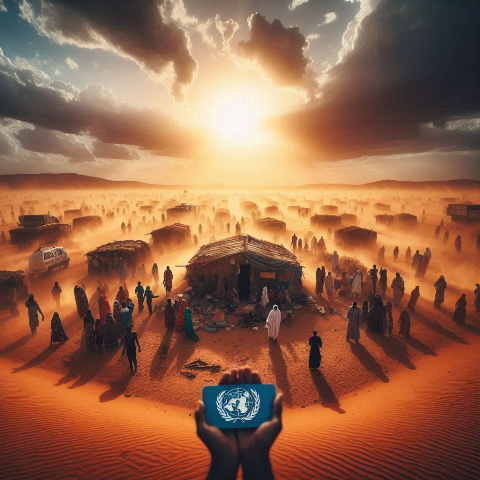The UN Refugee Agency (UNHCR) has expressed deep concern over the rapidly escalating humanitarian crisis in the Sahel Region.
In the Central Sahel countries of Burkina Faso, Mali, and Niger, over 3.3 million people have been forcibly displaced due to relentless conflict, compounded by the worsening effects of the climate crisis, according to data from April 2024. This significant displacement of civilians calls for immediate international intervention to prevent further deterioration.
The security situation in the Central Sahel remains volatile, forcing countless individuals to flee their homes in search of safety and protection. Protection risks are widespread, with survey data from the first quarter of 2024 indicating that both displaced individuals and host communities view theft, attacks on civilians, and gender-based violence as major threats. Women and children are particularly susceptible to exploitation, abuse, and trafficking.
The dire conditions faced by the displaced are further exacerbated by the lack of adequate shelter, clean water, and sanitation. Persistent insecurity prevents many from returning home, leading to repeated displacement within countries and, increasingly, across borders.
Over the past four years, 2.8 million people have been internally displaced within Burkina Faso, Mali, and Niger, while the number of refugees from these countries has risen to 550,000 during the same period.
In Burkina Faso, the combined threat of violence and inadequate living conditions perpetuates a cycle of fragility. The past year has seen a significant outflow of Burkinabe refugees, with an estimated 117,600 arrivals in nearby coastal countries as of April 2024.
Currently, over 200,000 Malian refugees are in Mauritania, 130,000 in Niger, and nearly 40,000 in Burkina Faso. Additionally, 50,000 have fled to Algeria but lack access to asylum procedures. Meanwhile, Mali hosts around 94,000 refugees, mainly from Burkina Faso, Niger, and Mauritania, while contending with more than 354,000 internally displaced individuals.
Despite the insecurity and increasing pressures on local communities, neighboring countries within the Sahel region are commendable for keeping their borders open to refugees.
The increase in cross-border movement highlights the deepening crisis and the ongoing need for comprehensive responses in the Sahel, focusing on protection, assistance, and durable solutions. While significant efforts are underway, much more is required. UNHCR is advocating with the international community to:
Maintain Aid During Political Instability: To prevent exacerbating existing problems and increasing the likelihood of future crises, UNHCR calls for investment in essential protection and social systems, supporting communities before they are forced to move.
Adopt a Joint Humanitarian Approach: Envisage a collaborative effort between humanitarian, development, and peace actors, while redirecting funds to local organizations working on the ground for a more effective response.
Plan Long-Term Solutions: Provide lifesaving humanitarian assistance while building the resilience of displaced people and host communities.
UNHCR requires $443.5 million to address urgent humanitarian needs in Burkina Faso, Mali, Niger, Mauritania, and the Gulf of Guinea countries.











